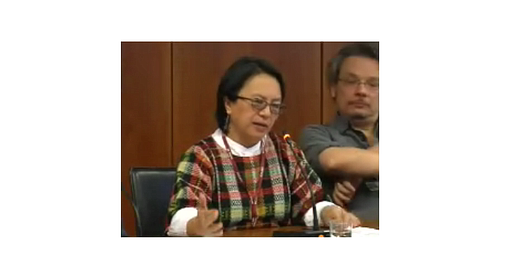Indigenous Peoples have not developed a position on emissions trading, either for or against, because it is up to local communities to decide their own position, said Victoria Tauli-Corpuz, chair of the UN Permanent Forum on Indigenous Issues and Executive Director of Tebtebba, at a side event in Bonn last week.
But the sort of “global mechanisms” that have led to the current financial crisis are “not acceptable for many Indigenous Peoples,” Tauli-Corpuz said.
Tauli-Corpuz made the comments during a side event in Bonn on 3 April 2009, “Indigenous Peoples roadmap to Copenhagen and beyond“, in which she reported on an Asia Summit on Indigenous Peoples and Climate Change that took place in February 2009 in Bali, Indonesia. The Bali meeting was one of three indigenous peoples’ meetings organised in the lead up to a Global Summit that will be taking place in Anchorage, Alaska on 20-24 April 2009. The other two meetings took place in Nairobi, Kenya and Lima, Peru.
Here’s an extract from Tauli-Corpuz’s presentation at the side event, taken from the video available on the UNFCCC website:
We also discussed our views about some of the issues that are being debated within the climate change discussions and one of these was the view on emissions trading. Because a lot of our indigenous communities, there has been some divisions et cetera, and in the discussions we agreed that we will not come up with one position on whether we are for or against emissions trading because we believe that indigenous peoples have the right to self determination and they are the ones, the ones in the local communities will be the ones who will make the decisions on whether they would like to be engaged with this or not. And we don’t think that an Asia Summit is in the right position to be coming up with such a stand.
Because in Asia we have seen that there are Indigenous Peoples who are engaged and who would like to be engaged with carbon trading. They also would like to be involved in some clean development projects, clean development mechanisms, and also in REDD, in forests, in the REDD processes. So we thought that it’s not possible for us to come up with just a yes or a no, it has to be some thing that will be made by the communities who are directly affected.
We also discussed the whole issue of the market mechanism and we said that of course indigenous peoples are not just against the market per se because we ourselves are also involved in the market, although this is more on the local market, we also get engaged in market mechanisms. Of course we are against a market mechanism which gives, which are the global mechanisms, especially the situation which has led to the collapse or the economic downturn that we are faced with right now. We think that kind of market, the financial market, is not really a sustainable kind of market and we believe that really is not feasible and is not acceptable for many indigenous peoples.
And finally we also agreed that we will enhance our capacities to be able to influence the climate change policies. So we decided that we will be having a series of trainings, develop popular education materials on the climate change issues and also do multi-media materials that will enhance the knowledge of indigenous peoples on this. And we have agreed that we will establish the Asian Indigenous Peoples Network on Climate Change which will be helping coordinate the actions that the indigenous peoples will be taking from the local up to the global level.






Comments following the original post on REDD-Monitor.org are archived here: https://archive.ph/p29Fn#selection-857.4-857.14